Conductivity meters
They are devices that serve to measure conductivity; also called conductivity meters, these equipment are composed of two plates of a special material such as: platinum, titanium, nickel, graphite, among others; a feeder source and a measurement scale; they work in a certain way and there are different types and each one yields a result of a specific conductivity.
Conductivity meters have wide applications, as the instrument not only works for the inspection of water quality, but also for the control in the water of the values of PH, electrical conductivity, oxygen and for the measurement of temperature, so it becomes an ideal instrument for analysis in the field.
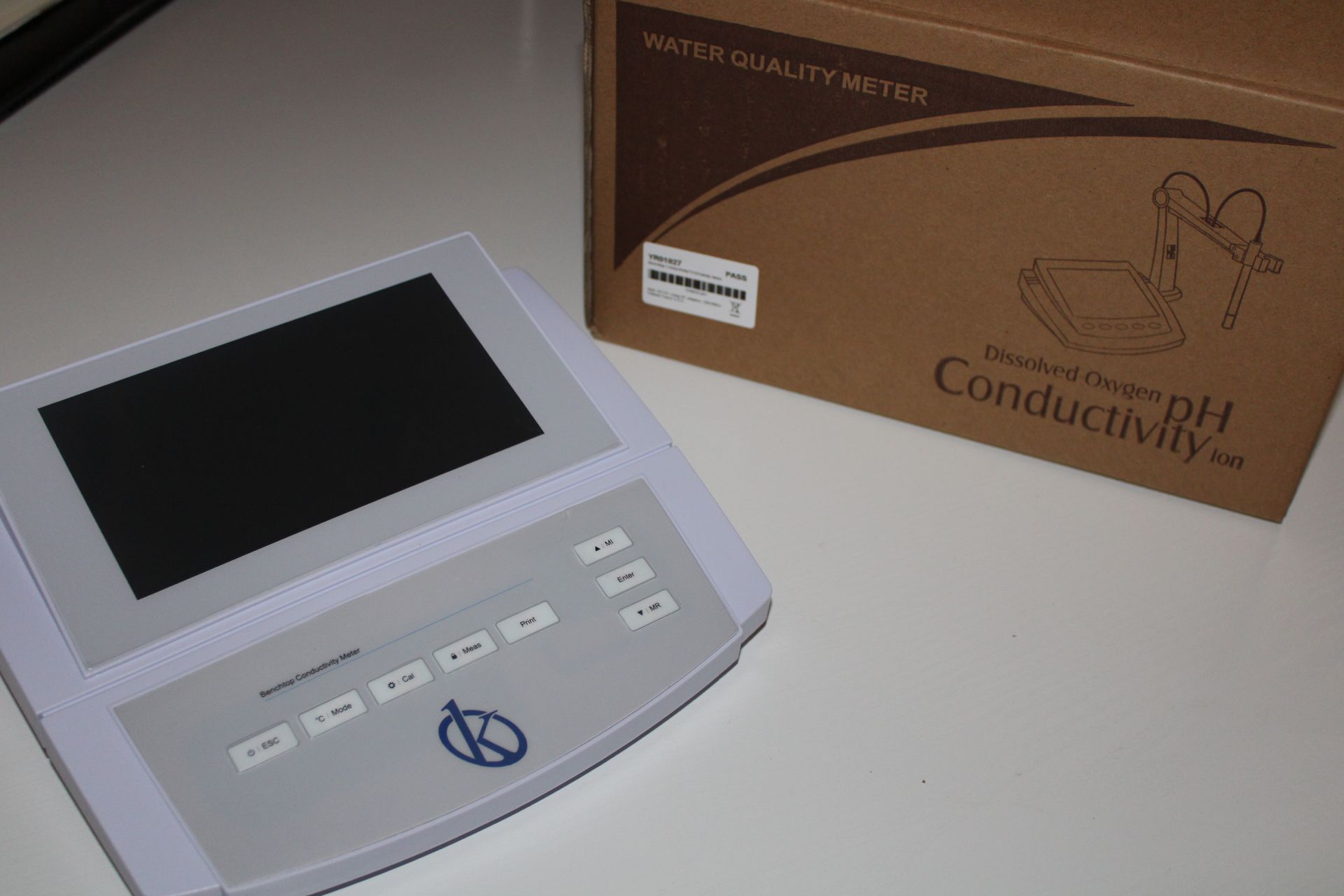
Types of Conductivity Meters that a Laboratory may require
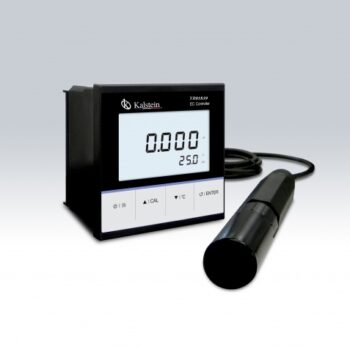
Conductivity controller
- The inexpensive inline conductivity controller comes with a platinum conductivity electrode.
- 1 to 3 point calibration with automatic recognition of conductivity standards.
- Selectable cell constant, temperature coefficient and TDS conversion factor.
- Automatic temperature compensation ensures accurate readings throughout the range.
- The configuration menu allows you to configure the number of calibration points, alarm limits, hysteresis value, 4 to 20 mA output, etc.
- The reset function automatically resumes all settings to the factory default values.
Portable
• Low-range pocket salinity tester contains the conductivity measurement mode.
• Platinum conductivity cell provides the quick and reliable measurement results.
• 1 to 3 points calibration with automatic recognition for conductivity standards.
• Automatic temperature compensation ensures accurate readings over the entire range.
• Auto-Read function senses and locks the measurement endpoint.
• Auto-Power Off effectively conserves battery life.
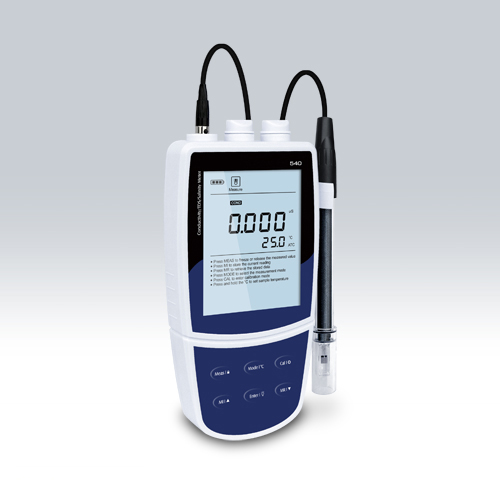
In Kalstein you can find the Ideal Conductivity Meters for your Laboratory
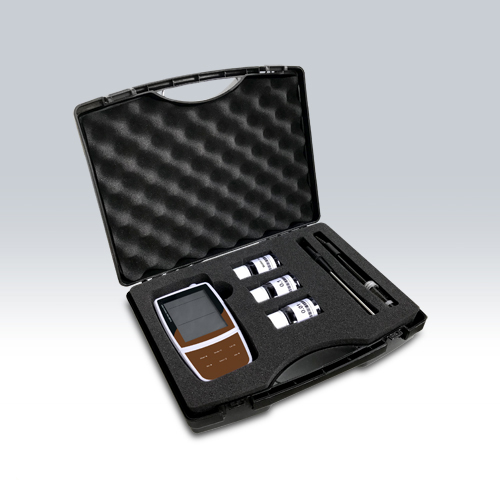
Multi-parameter portable water quality meter YR01820
1-point offset calibration allows the displayed value to be adjusted to a known standard.Relative and absolute millivolt ...
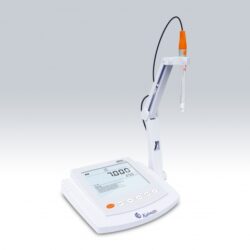
Benchtop DO / Conductivity Meter YR01837
High-accuracy multiparameter water quality meter contains 13 options, the meter is suitable for measuring the conductivity...
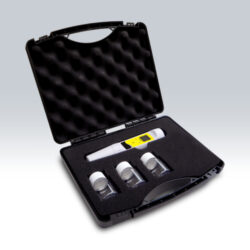
Pocket Salinity Meter YR01815-1
High-range pocket salinity tester, 1 to 3 points calibration, setup menu contains 5 options. The meter is suitable for measuring the seawater, accuracy: 1% F.S, High-range pocket ...
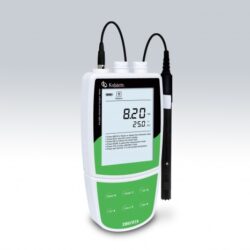
YR01819 Portable Dissolved Oxygen Meter
Economical portable dissolved oxygen meter, 1 or 2 points calibration, Automatic Temperature Compensation. The meter is suitable...
Our Best Selling Conductivity Meter
• Precision laboratory conductivity meter is equipped with a backlit LCD display.
• 1 to 3 points calibration with automatic recognition for conductivity standards.
• Selectable cell constant, temperature coefficient and TDS factor.
• Automatic temperature compensation corrects conductivity measurment to reference
temperature.
• Auto-Read function senses and locks the measurement endpoint.
• Setup menu allows setting the number of calibration points, temperature unit, etc.
| Model | YR01830 |
| Conductivity | |
| Range | 0.01 to 20.00, 200.0, 2000µS/cm, 20.00, 200.0mS/cm |
| Resolution | 0.001, 0.01, 0.1, 1 |
| Accuracy | ±1% F.S. |
| Calibration Points | 1 to 3 points |
| Calibration Solutions | 10µS, 84µS, 1413µS, 12.88mS, 111.8mS |
| TDS | |
| Range | 0 to 10.00, 100.0, 1000ppm, 10.00, 200.0ppt |
| Resolution | 0.01, 0.1, 1 |
| Accuracy | ±1% F.S. |
| TDS Factor | 0.1 to 1.0 (default 0.5) |
| Temperature | |
| Range | 0 to 105°C/32 to 221°F |
| Resolution | 0.1°C/0.1°F |
| Accuracy | ±1°C/±1.8°F |
| Offset Calibration | 1 point |
| Calibration Range | Reading ±10°C |
| General Specifications | |
| Temperature Compensation | 0 to 100°C/32 to 212°F, manual or automatic |
| Temperature Coefficient | Linear (0.0 to 10.0%/°C) |
| Reference Temperature | 25°C |
| Cell Constant | K=0.1, 1, 10 or custom |
| Hold Function | Manual or auto-endpoint |
| Connector | 6-pin nimi-DIN, 3.5mm jack socket |
| Display | Custom LCD (120×60mm) |
| Power | DC9V, using AC adapter, 220V/50Hz |
| Dimensions | 210(L)×205(W)×75(H)mm |
| Weight | 1.5kg |
| Order Code | Accessories |
| YR01830 | CON-1 conductivity electrode |
| TP-10K temperature probe | |
| Conductivity standards 84µS/cm, 1413µS/cm, 12.88mS/cm | |
| DC9V power adapter | |
|
YR01830-2
|
CON-0.1 conductivity electrode |
| CON-1 conductivity electrode | |
| TP-10K temperature probe | |
| Conductivity standards 84µS/cm, 1413µS/cm, 12.88mS/cm | |
| DC9V power adapter | |
| YR01830-1 | CON-1 conductivity electrode |
| CON-10 conductivity electrode | |
| TP-10K temperature probe | |
| Conductivity standards 84µS/cm, 1413µS/cm, 12.88mS/cm | |
| DC9V power adapter |
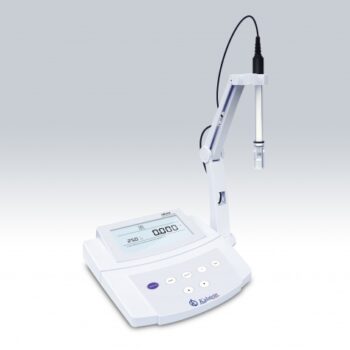
Catalog of Conductivity Meter models on offer
Guides to become an expert in Conductivity meters
Multiple Applications of Conductivity Meters in the Food Industry
In the age of high technology, the food industry is constantly evolving and adapting in pursuit of efficiency and optimization ...
Conductivity meter or conductivity meter: How should he be employed?
Conductivity is a measure of the property of aqueous solutions to conduct electric current, this property will depend on the...
KALSTEIN - Laboratory conductivity meter: what is it?
They are devices that serve to measure conductivity; also called conductivity meters, these equipment are composed of two...
Electric conductivity
Conductivity is defined as the ability of a substance to conduct electrical current and is the opposite of resistance; it is a measure of the property that aqueous solutions possess to conduct electrical current. This property depends on the presence of ions, their...
Videos of Conductivity Meters in Operation
In this section you can find our Conductivity Meters in operation, packaged, being serviced, etc.
Working Conductivity Meters
In the case of measurements in aqueous solutions, the value of the conductivity is directly proportional to the concentration of dissolved solids, therefore, the higher said concentration, the greater the conductivity.
In addition to normal conductivimeters, there are instruments that automatically convert the conductivity value into ppm, directly offering the measurements of dissolved solids concentration.
The conductivity of a solution is determined by a molecular movement. The temperature influences this movement, so it is necessary to take it into account when making precision measurements. Generally, for comparative measurements, the reference temperature is 20 °C or 25 °C. To correct the effects of temperature, a compensation factor β is used. It is expressed in% / °C which varies according to the composition of the solution being measured. In most applications, the β coefficient is set at 2% / ºC.

Frequently Asked Questions about Conductivity Meters
How to know the prices of the Conductivity Meters?
To know the price of the Conductivity Meters we invite you to send us an email with your request using the contact form....
What are the lead times for Conductivity Meters?
- If the equipment of your interest is in stock or if it must be manufactured.
- The type of freight you have chosen, this may be; air or sea.
How to make a purchase of Conductivity Meters?
- By email: [email protected]
- By telephone: +33 (0) 1 78 95 87 02
- E-commerce: Via Kalstein's official website in your country.
How does the warranty work?
Can I request a quote online?
Of course, you can request a quote for the Kalstein team of your interest, directly from our official website. Once you have identified your preferred model, click HERE
